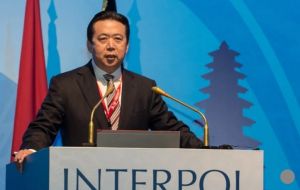MercoPress. South Atlantic News Agency
Ex Interpol chief sentenced in China to 13 years in prison for bribery
 Meng - a former vice minister of public security - is among a growing group of Communist Party cadres caught in President Xi Jinping's anti-graft campaign
Meng - a former vice minister of public security - is among a growing group of Communist Party cadres caught in President Xi Jinping's anti-graft campaign Former Interpol chief Meng Hongwei, who was detained on a visit to China in 2018, was sentenced on Tuesday (Jan 21) to more than 13 years in prison for bribery in a case that shook the international police organization.
Meng - a former vice minister of public security - is among a growing group of Communist Party cadres caught in President Xi Jinping's anti-graft campaign, which critics say has also served as a way to remove the leader's political enemies.
He vanished during a visit to China from France, where Interpol is based, and was later accused of accepting bribes and expelled from the Communist Party. His wife was granted political asylum in France last year, after saying she was afraid she and her two children would be the targets of kidnapping attempts.
The 66-year-old was sentenced to 13 years and six months in prison and fined two million yuan (US$290,000), said the Tianjin First Intermediate People's Court on Tuesday.
At his trial last June, Meng pleaded guilty to accepting US$ 2.1 million in bribes, after the court said he used his status and positions to “seek improper benefit”, illegally acquire property and accumulate bribes. The court statement on Tuesday said that some of the “stolen money and stolen goods could not be recovered”.
Pictures from the court showed a grim-faced Meng standing in front of a judge, flanked by two police officers.
Meng had “truthfully confessed to all the criminal facts” and would not appeal the decision, the court said.
The country's public security bureau has linked Meng's case to a broader initiative to “completely remove the pernicious influence” of Zhou Yongkang, a former security czar who was sentenced to life in prison in 2015 for bribery, abuse of power and leaking state secrets.
Meng was appointed as vice security minister by Zhou in 2004.
In that role, he was entrusted with a number of sensitive portfolios, including the country's counter-terrorism division, and he was in charge of the response to violence in China's fractious northwestern region of Xinjiang.
During Meng's tenure, China's public security bureau also arrested and interrogated a number of prominent Chinese dissidents, including Nobel Peace Prize laureate Liu Xiaobo, who later died of liver cancer while in police custody.
In 2013, Meng was appointed director of China's maritime police bureau, which includes the country's coast guard and maritime anti-smuggling authorities.
He was the first Chinese president at Interpol - raising concerns among human rights groups who feared Beijing's influence reaching overseas - and was expected to serve a four-year term until 2020.
When he vanished in September 2018 he sent his wife a message telling her to “wait for my call”, and then a knife emoji signifying danger. A few weeks later, Interpol was informed that Meng had resigned, with Beijing later announcing he was being held on suspicion of taking bribes.
Meng's wife has argued that Chinese officials had presented “no proof whatsoever to back up their charges”. He was replaced as president of Interpol by South Korea's Kim Jong-yang.




Top Comments
Disclaimer & comment rulesCommenting for this story is now closed.
If you have a Facebook account, become a fan and comment on our Facebook Page!